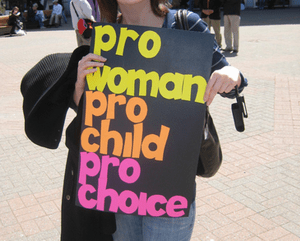Pro-Life, Pro-Choice: What Does it All Mean, Anyway?
Ottawa Pro-Choice Presence at the 2010 National March for Life. Photo by Jenn Farr via Flickr.
Part 2 of the Series Reading Our Rights
Merriam-Webster Dictionary defines “pro-choice” as “favoring the legalization of abortion.
That's it. End of blog post.
I'm kidding, of course, but in some ways, it really is that easy. I've talked to plenty of people who claim it's not that simple, and who try to create all this gray space between the pro-choice and pro-life movements, but in my view, you can determine whether someone's pro-choice or pro-life with one simple question:
Do you believe that abortion should be legal so that women, should they choose, can have access to it?
Yes? Then you're pro-choice. If your answer is “Yes, but…” then guess what? You are still pro-choice. Even if you would never personally get an abortion, or encourage someone else to, even if your religion prohibits abortion, or you feel morally opposed to it. If you still believe that each woman is entitled to choose for herself whether she wants or needs an abortion, then congratulations. You are pro-choice.
If your answer is no? Then there are a variety of labels you can claim: anti-abortion activist, anti-choice, anti-feminist, and the more noble-sounding pro-life (more on the problematic nature of that term in a bit).
If you've ever found these terms confusing, there's definitely a reason. These labels, as we know them today, sprang up in the 1970s as part of the furor surrounding the 1973 Roe v. Wade case, which legalized abortion in the United States. This Supreme Court decision precipitated the formation of groups such as the National Right to Life Committee, Live Action, and the Susan B. Anthony List (pro-lifers love to say that Susan B. Anthony was opposed to abortion rights, which is a...tenuous historical claim at best, and also sort of beside the point in this modern discourse), all founded with the stated goal of rolling back the decision and returning abortion to its erstwhile illegal status.
Marketers, take note: the choice of the label “pro-life” was a masterstroke move on these activists' part. According to this Quartz article, the term “pro-life” was coined in the 1960s to describe a variety of political views that had nothing to do with abortion, from anti-war stances to support of LGBT rights. But post-Roe v. Wade, those who supported abortion latched onto it, and thus positioned themselves as the group that supports something as universal, basic, and beloved as life. And by implying that they are pro-life, then they imply that their opponents are…well, you get the idea.
My personal feelings about the so-called pro-life movement aside, I'm trying to approach people who count themselves as part of its ranks with compassion, and to remind myself that many of them (many of you, perhaps) genuinely believe that they are defending the rights of what they call the unborn. For those who believe that life begins at conception, abortion is murder. No wonder they oppose it.
But I can approach people with compassion and understanding and still know that objectively, their beliefs are based on a set of murky facts and subjectivities. Scientifically, no one knows when life begins, and in fact, the more scientists learn about conception and fetal development, the more confusing this question becomes. With no clear scientific consensus on this issue, the question becomes one of philosophy and religion. In the narrative espoused by pro-lifers, a fertilized egg gains personhood at conception, which is a belief supported by some branches of Christianity and some personal philosophies. While these viewpoints are certainly legitimate ways of interpreting the world, they are not universal enough to impose onto others. After all, in the teachings of other philosophies and religions, including Judaism, life does not begin at conception. Therefore, in advocating for the end of legalized abortion, pro-lifers are imposing their own religious and philosophical beliefs about when life begins onto others.
Why should they be able to claim the pro-life label when there are plenty of equally legitimate narratives that disagree on something as broad and complex as the beginning of a life? Why should they be able to claim the pro-life label when the policies this movement supports do not defend life at all?
The bottom line is that they shouldn’t.
What should we call pro-life people when writing about them, in this blog series or otherwise? And for that matter, what should we call pro-choice people?
A word about the history of the term pro-choice: it sprang up as a counter to the term pro-life to describe activists who are working to uphold Roe v. Wade and keep abortion legally accessible in the United States. Many media outlets and resources, including the Associated Press style guide, refuse to use either of these terms. They say that both constitute cases of political framing, in that both skew the debate by choosing politically advantageous names for themselves. I agree with the A.P.––well, with half of its argument. As a term, pro-choice is okay in my book. These activists are literally pro-choice, not “pro-abort” or “pro-baby killing.” They are in favor of women whether women, as individuals, are pro-abort or not. Additionally, the term “pro-life” is dangerous in its obfuscation of a hard truth: maternal mortality rates tend to rise when women don't have access to abortion, meaning that “pro-lifers” are not, actually, very pro-life at all.
For our series, we've decided to keep the term pro-choice, as it accurately describes a group of people who support women's right to decide how they feel about abortion for themselves. However, we will use the term anti-choice instead of pro-life to describe people who want to repeal Roe v. Wade and make abortion illegal. Language helps shape the terms of the debate, and in this case, we don't feel comfortable allowing one side to control the conversation by labeling themselves with such a fundamentally misleading term. Let’s reclaim this word and acknowledge that by defending women’s rights to autonomy over their own bodies and destinies, pro-choice women are actually, dare we say it, the most pro-life of them all.
Love Emily's piece? Let us know and get an alert each time the next Reading Our Rights post goes live!







